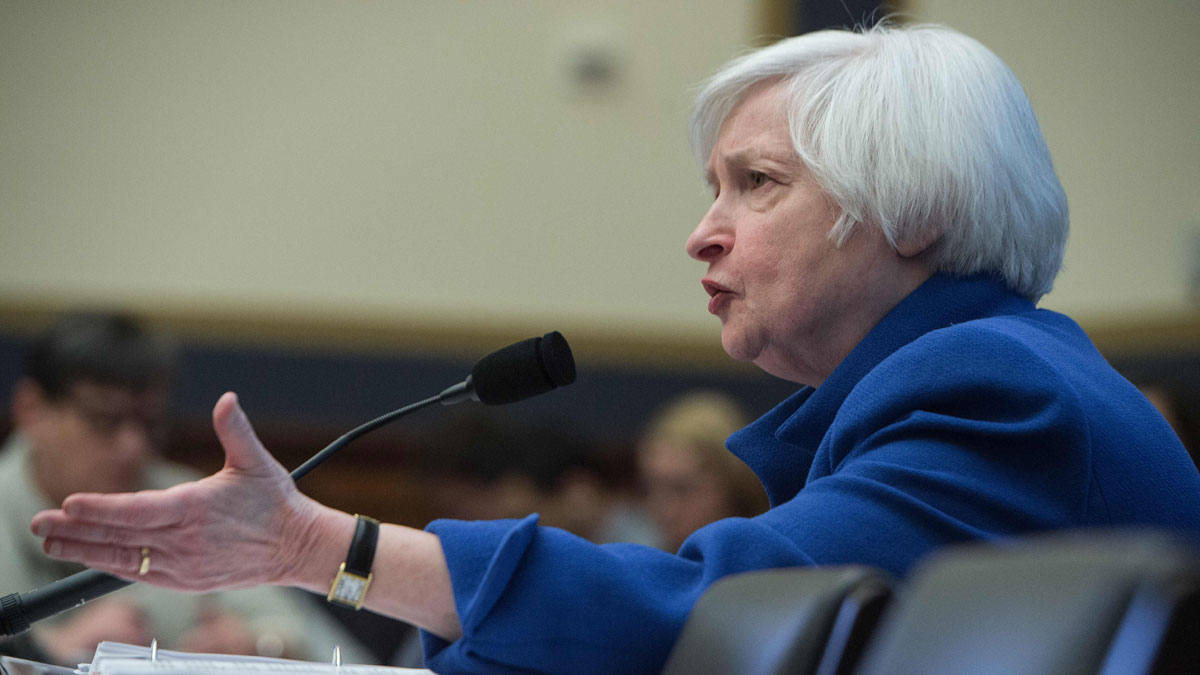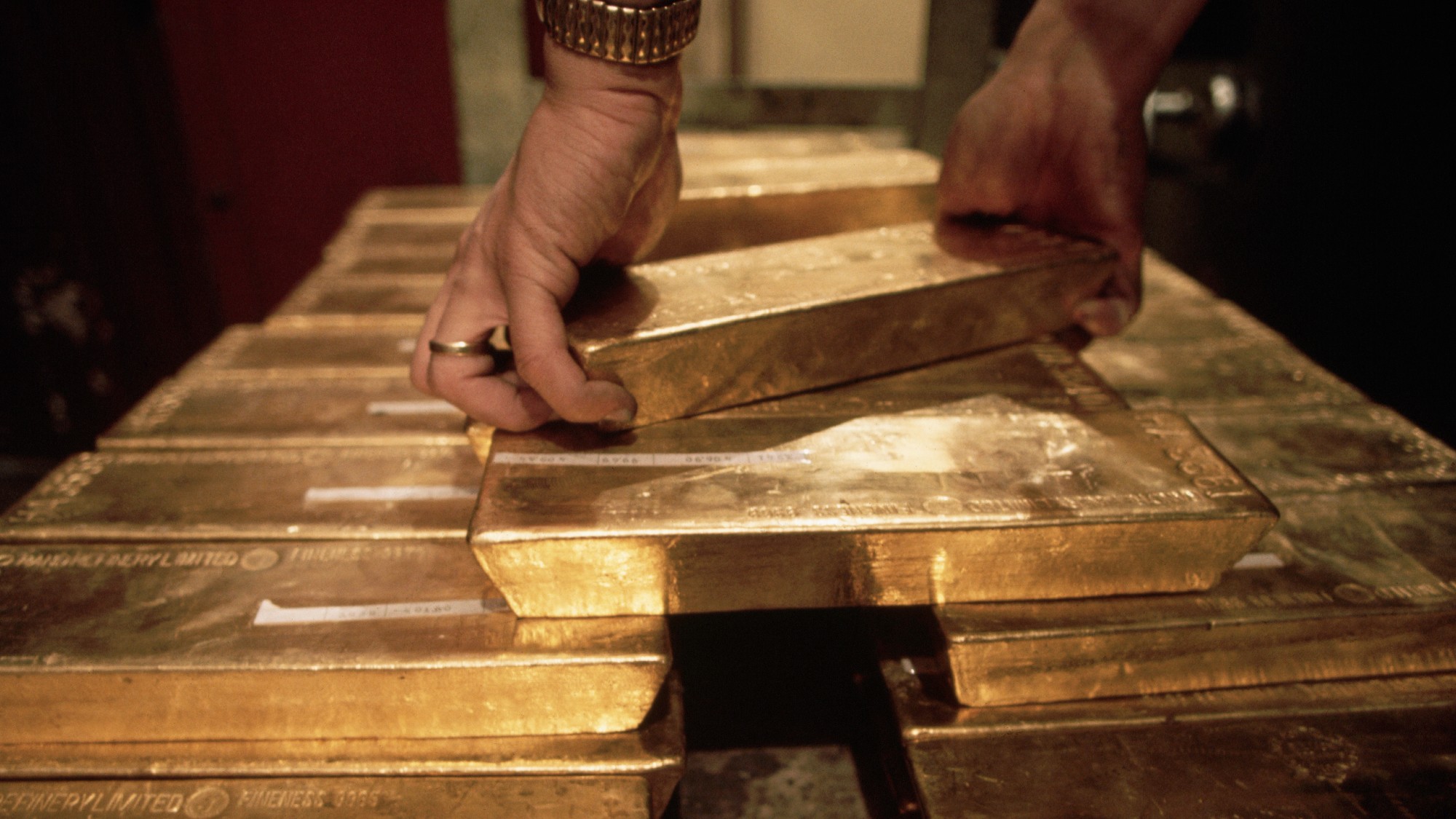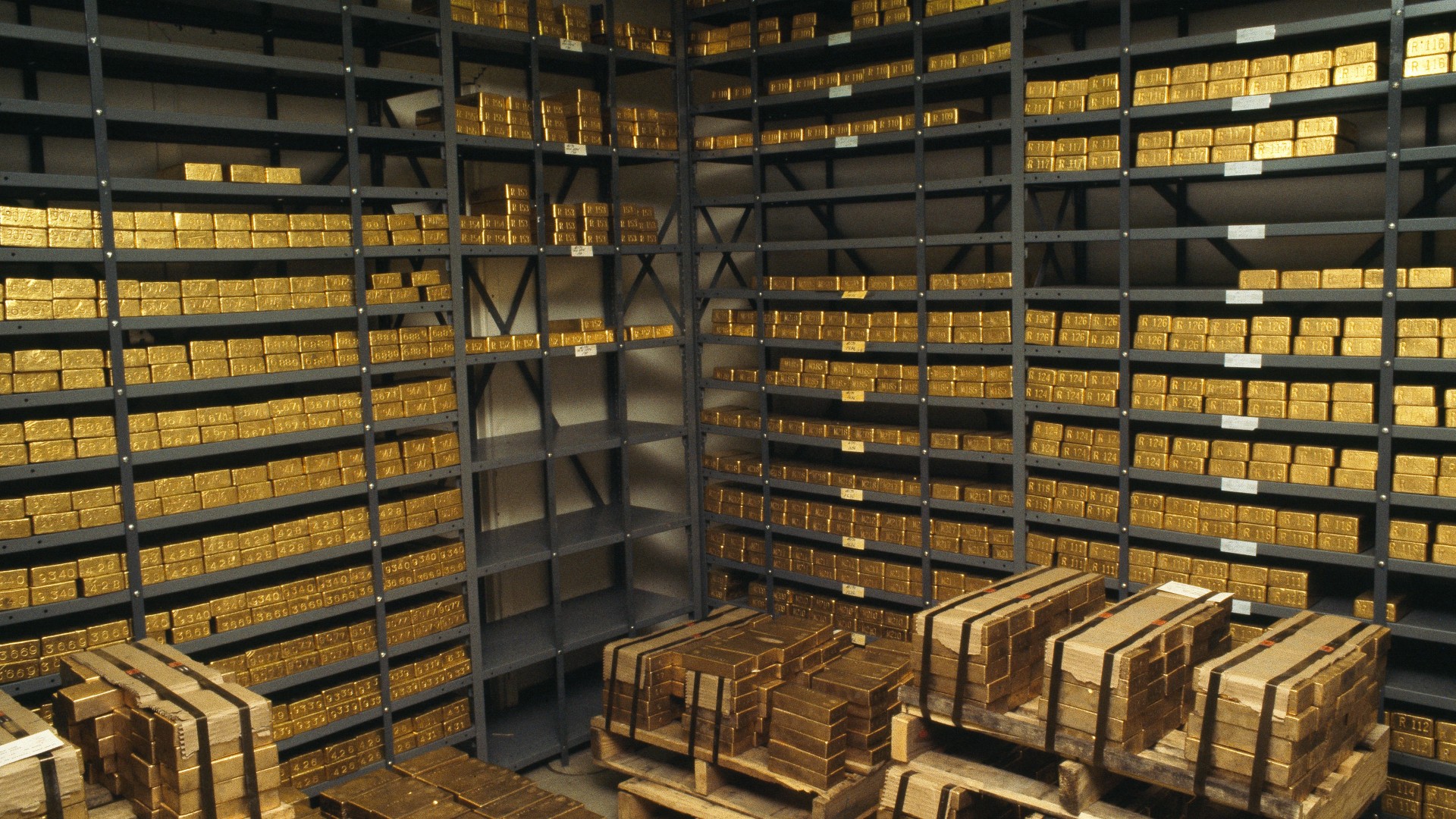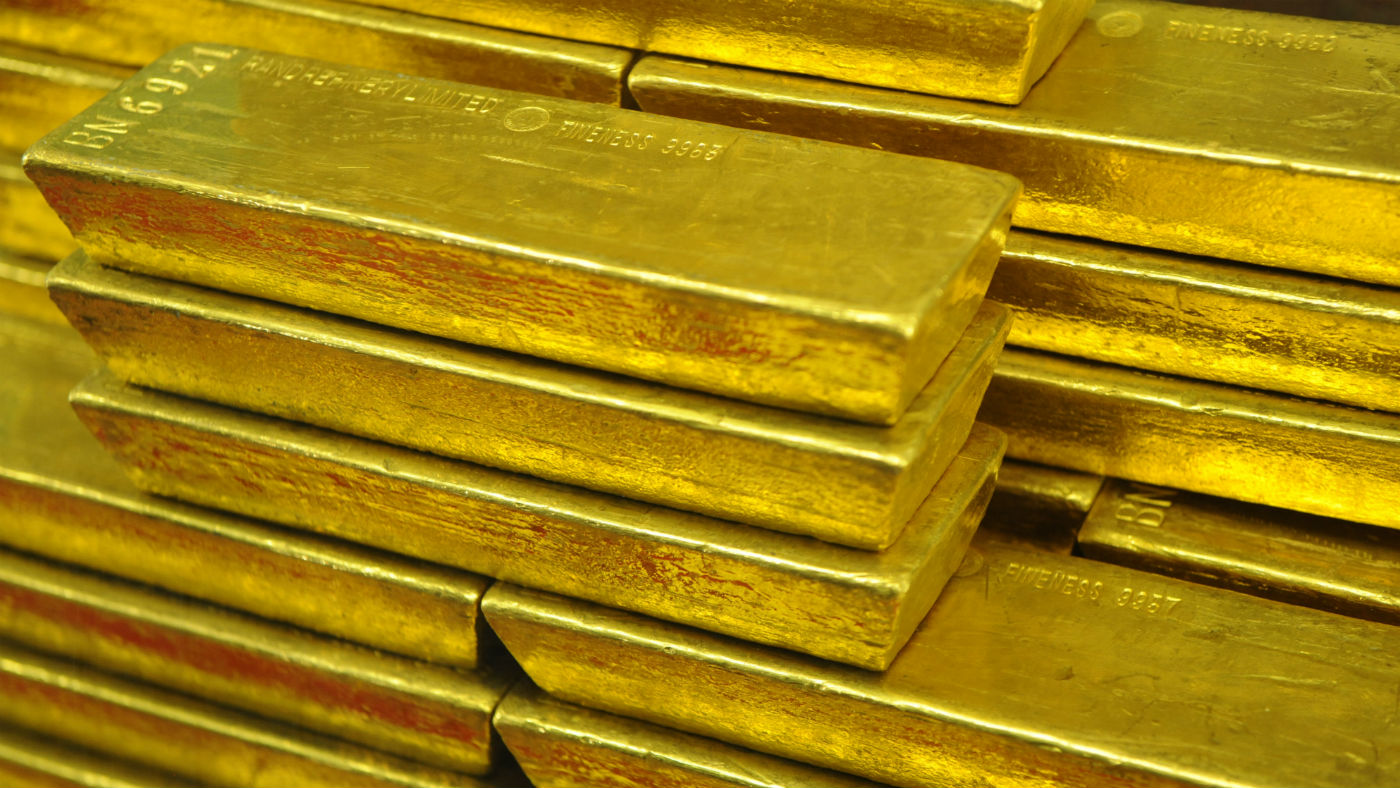Gold price waits for rates clues from Jackson Hole
Political turmoil in the US has the potential to 'help gold in the short and longer term'

A free daily email with the biggest news stories of the day – and the best features from TheWeek.com
You are now subscribed
Your newsletter sign-up was successful
Gold price slump: how low can it go?
24 July
Gold has had a tough few days. A combination of a strong US dollar, looming interest rate rises on both sides of the Atlantic and an improvement in global economic fortunes prompted a 'flash crash' in the gold price at the start of the week, and as it ends there is no sign of an imminent recovery.
The Financial Times notes that, having declined by a further one per cent to $1,084 in Friday trading, the precious metal is now at its lowest level since February 2010. CNN adds that gold had declined for ten straight sessions in the US, a losing streak unparalleled since 1996.
The Week
Escape your echo chamber. Get the facts behind the news, plus analysis from multiple perspectives.

Sign up for The Week's Free Newsletters
From our morning news briefing to a weekly Good News Newsletter, get the best of The Week delivered directly to your inbox.
From our morning news briefing to a weekly Good News Newsletter, get the best of The Week delivered directly to your inbox.
"To put that in perspective", it says, "back then oil prices were fetching just $19 a barrel". Without a major recovery today it will have racked up five consecutive weeks of losses, according to Bloomberg data.
Investors are apparently piling out of gold funds, but is the current slump a buying opportunity or will prices continue to slide?
Citibank analyst David Wilson told Business Insider he believes that the gold price will remain under pressure in advance of the Federal Reserve's September policy meeting, at which it is now widely expected to raise the interest rate from its lowly 0.25 per cent.
Climbing rates tend to reduce the attraction of non-yielding commodities such as gold, with analysts saying the next key milestone will be $1,044 an ounce, its 2010 low.
A free daily email with the biggest news stories of the day – and the best features from TheWeek.com
Others are even more bearish. Jeff Currie, New York-based head of commodities research at Goldman Sachs, said earlier this week in remarks reported by the Daily Telegraph that downward pressures affecting all commodity markets could force gold down below $1,000 an ounce. The paper says ABN Amro Bank's Georgette Boele and Robin Bhar of Societe Generale also believe bullion will approach this symbolic threshold by December.
But others expect a recovery. CNN Money cites George Gero, vice president of global futures at RBC Capital Markets, who says gold might be able to withstand the strong dollar, which reduces buying power for gold, and that it should be "due for at least a short-term bounce next week".
Profit Insider says there is reason to suspect China, which revealed disappointing levels of gold buying this week, could be set to invest more heavily in the metal to meet targets set by the International Monetary Fund to qualify the Renminbi as a reserve currency, which would prompt a surge. It suggests that the gold price could reach $2,500 an ounce, but not until later next year.
Gold price: six reasons it slumped – and why it could stay low
22 July
The gold price mounted a modest recovery yesterday following a sharp fall on Monday, but after closing below $1,100 for the first time in five years it is still hovering around this key threshold.
Analsts once predicted that gold prices would surge to $5,000 an ounce, but now many are saying that the precious metal could fall back through the $1,000 mark before the end of the year – and a slump into three figures could well trigger more falls.
Investors are beginning to take notice. Listed funds tracking the metal, which have been growing in popularity, saw the biggest outflow in two years on Friday, The Times reports. So what is driving the recent slump and is it likely to continue?
1. The strength of the US dollar
The US dollar has been gaining in value on the back of consistently positive data on the economy, which spells bad news for gold. As the Daily Telegraph notes, the value of the greenback typically has an inverse relationship with commodities.
Why? Like other commodities, gold is priced in dollars on international markets. This means that when the dollar rises investors have less buying power and commodities become more expensive, "muting demand and sending commodity prices lower", the paper says.
2. The strength of the US dollar, part 2
But that isn't the only reason that gold sinks with the dollar surges. The Economist suggests that the declining gold price is also a product of investors re-evaluating the real price of the metal in response to currency movements.
Essentially, if the dollar increases so does the nominal value of any asset quoted in dollars. But if this runs counter to investors' perception of the market, they are likely to sell to ensure they aren't caught out later.
3. Interest rate rise
Another factor emanating from the US is the recent talk of an interest rate rise. The Federal Reserve has been dropping strong hints that it may increase the base rate from 0.25 per cent sooner rather than later, and possibly this year. That will diminish the attraction of non-yielding assets.
Since gold provides neither a dividend nor an income, ther is an opportunity cost of holding the asset. That may be worth paying in bad times, when interest rates are low and the gold price is likely to be rising. When markets are improving, interest rates are rising and returns are increasing, that opportunity cost starts to pinch.
4. China
Not all the factors driving down the gold price originate in China: The Times points to China as another source of gold-sapping news – and, more specifically, to data showing that the country, which has designs on making its own Renminbi a reserve currency, has not been buying up gold in the quantities many have anticipated.
China's gold reserves were up 57 per cent, but this was about half what was expected. As a share of total reserves, China's holdings were actually in decline. Chinese acquisitiveness was one of the key assumptions underpinning the market in recent years, so this constitutes a major hiccup.
5. Less bad news
Greece has stepped back from the abyss – at least for now. The global economy seems to be trundling along and Western countries are seeing a return to growth. An apocalypse predicted by many, which would have scared investors into assets such as gold, has not happened.
6. Technical trades
This last point is one often missed in analyses of any sharp market fall. Many trades are now executed on an automated basis, the Telegraph says, with software which is designed to buy or sell when a price hits a given high or low level to manage risk in big portfolios.
Gold has reached the sort of low where the 'stop-loss' trades kick in, further fuelling a sell-off. The irony is that these programmes are designed to limit risk exposure and losses when in reality they often exaggerate market swings and increase nominal losses.
Will the slide continue?
There certainly seems to be a consensus that gold is not going rebound strongly any time soon. Some think the inflation-adjusted price for gold is even lower than $1,000, so it's not out of the question that prices could continue to fall.
But if the macroeconomic picture were to change and become more negative, or China were to start buying in the way analysts have been predicting, attitudes to gold would probably change quite quickly.
Gold price 'to climb' on Greek exit from eurozone
16 July
The gold price could rise "a lot further" if Greece defaults on its debt repayments and is forced to exit the eurozone, according to a leading independent economic research company.
Investors are expected to use gold as a hedge if Greece fails to repay €1.6bn (£1.2bn) to the International Monetary Fund by the end of June, which could trigger an exit from the eurozone – or Grexit.
Gold has been trading at around $1,180 per ounce this week, up 0.8 per cent in the past week and 0.5 per cent in the past month, the Sydney Morning Herald reports.
And although gold price has been hovering between $1,170 and $1,210 per ounce for several months, many analysts now believe it could be set to climb as investors look to mitigate risks as Greece edges towards default.
"We are only just starting to see signs of contagion from Greece to other bond and equity markets in the eurozone," Capital Economics analysts told investors in a note.
"A Greek default alone may no longer be a huge surprise and the sums involved would be small in the global scheme of things. However, if the uncertainty undermines investor confidence in the rest of the region, the gold price is likely to climb a lot further."
According to Capital Economics, the impact of a Greek exit could be more profound than many analysts are currently predicting because "if Greece's economy eventually thrived outside the eurozone, as we expect it would, this might fuel the rise of anti-austerity and euro-sceptic movements in other European countries".
Gold price spike as chances of US interest rate rise recede
21 May
Gold prices spiked yesterday after minutes from the Federal Reserve’s April meeting revealed officials doubt the economy is ready for an interest rate increase in June.
Within second of the release of the "dovish" minutes from the Fed, spot gold climbed 0.5%, to a session high at $1,213.36, reports the Wall Street Journal. Although it fell back to $1,207.40 an ounce, it remained positive for the day.
According to the Fed minutes, key officials at the April policy meeting believed that the current bump in US inflation was being offset by a weaker labour market and softer data. The cautious stance will boost gold and bonds, say analysts.
"A close reading of the April minutes shows the committee remains extraordinarily cautious regarding a rate liftoff given members' emphasis on the first-quarter slowdown," Tai Wong, director of base and precious metals trading for BMO Capital Markets in New York, told Reuters.
"The bar remains quite high for an interest rate move and it appears quite unlikely that it will happen before September if even then."
The knock-on effect on gold prices brings to an end a tricky period for the commodity. Since mid-March, gold prices have struggled to break out of a $1,170-$1,230 an ounce range, due to uncertainty over the timing of the expected rise in US interest rates.
Higher interest rates tend to hit gold because they increase the opportunity cost of holding non-yielding bullion while boosting the dollar, in which it the commodity is priced.
Other metals were boosted yesterday. Silver gained 0.7% to $17.16 an ounce, while platinum was up 0.5% at $1,158.70 an ounce.
Gold price pinned down despite Russian spree
01 May
Russia's continuing purchase of bullion is a rare bright spot in a difficult period for the gold price, which has sunk to around $1,200 an ounce, a third below its peak in 2011.
Moscow, where the central bank has been a notable buyer of gold, has tripled its holdings since 2005, reports The Economist. Last month alone it bought 30 tonnes, bringing its overall chest to 1,238 tonnes.
Consumers in China and India have also continued to splash out on gold, but none of this has been enough to lift the metal out of a rut.
That rut continues despite a host of factors that could be expected to boost prices. Uncertainty is supposed to lift the price of gold, yet turmoil in the Middle East and Ukraine, and dramas in the euro zone have failed to prompt a rally. Neither has loose monetary policy proved as much help as hoped.
Investment guru Harry Dent writes: "We've seen everything gold bugs could hope for: endless money printing, zero per cent interest rates (both short-term and long-term adjusted for inflation), rising debt and debt ratios in the public and private sectors... So where's the damn hyperinflation?"
Many argue that significant pressure is placed on the price of gold by the expectation that US interest rates will rise later this year. As banker Matthew Turner explains, low interest rates cut the opportunity cost of owning gold, while higher interest rates raise the cost of holding non-interest-bearing assets.
Some believe that anticipation of rising rates is already built into current gold prices. Should the rise not come about as soon as expected, there could be a rally. Meanwhile, producers are struggling: half have negative cashflow, many are heavily in debt. Options such as Bitcoin, property and contemporary art are proving more tempting for many investors.
Gold price falls despite weak US dollar
23 April
The gold price fell below $1,200 yesterdat, as traders weighed the weakening dollar against the prospect that Greece could be forced out of the eurozone if it fails to meet its creditors' demands.
Prices recovered slightly this morning, but remained at $1,190 per ounce at 1pm BST.
"The trading range has become very tight over the past ten days and sideways performance like that is drying up liquidity," saidSaxo Bank senior manager Ole Hansen told Reuters. "If anything, in a day like this, with European markets down, I would be a cautious buyer looking for a potential bid on the back of the weaker dollar."
Over the past month, the strong US dollar has put pressure on the gold price, but yesterday morning it shed 0.5 per cent of its value, heralding the possibility that the price of gold may soon start to climb.
"We wait to see if the dollar weakens further; if it does, we would expect the metals to pick up," FastMarkets analyst William Adams said.
Traders have also been following developments in the Greek debt crisis finances. If Greece does not agree to a comprehensive list of reforms by Friday, analysts say the country could take a step closer to exiting the eurozone. If the country is forced out of the joint currency, gold will become an increasingly tempting looking safe haven, Bullion Desk reports.
-
 The ‘ravenous’ demand for Cornish minerals
The ‘ravenous’ demand for Cornish mineralsUnder the Radar Growing need for critical minerals to power tech has intensified ‘appetite’ for lithium, which could be a ‘huge boon’ for local economy
-
 Why are election experts taking Trump’s midterm threats seriously?
Why are election experts taking Trump’s midterm threats seriously?IN THE SPOTLIGHT As the president muses about polling place deployments and a centralized electoral system aimed at one-party control, lawmakers are taking this administration at its word
-
 ‘Restaurateurs have become millionaires’
‘Restaurateurs have become millionaires’Instant Opinion Opinion, comment and editorials of the day
-
 What a rising gold price says about the global economy
What a rising gold price says about the global economyThe Explainer Institutions, central banks and speculators drive record surge amid ‘loss of trust’ in bond markets and US dollar
-
 Gold tops $4K per ounce, signaling financial unease
Gold tops $4K per ounce, signaling financial uneaseSpeed Read Investors are worried about President Donald Trump’s trade war
-
 Safe harbor: Gold rises as stocks sink
Safe harbor: Gold rises as stocks sinkfeature It's a golden age for goldbugs
-
 What rising gold prices can tell us about the economy in 2024
What rising gold prices can tell us about the economy in 2024The Explainer Market hits all-time high, boosted by a weakening US dollar and rising global tensions
-
 Gold’s ‘flash crash’: what the experts think
Gold’s ‘flash crash’: what the experts thinkfeature Bad news, good news and a loss of faith
-
 What is the price of gold and when is best to buy?
What is the price of gold and when is best to buy?Speed Read Economic and geopolitical uncertainty traditionally drives investors to reliable metal markets